- Home
- J. T. Edson
The Floating Outfit 27
The Floating Outfit 27 Read online
The Home of Great Western Fiction!
Despite being on very good terms with Freddie Woods, Dusty Fog knew no more about her past than anybody else in the trail end town of Mulrooney. But with the coming of the British Railroad Commission to the town the secret of the beautiful and talented Freddie was disclosed. And as a result, she was threatened with extradition to stand trial for murder.
Dusty Fog had to face the decision of his life. As Town Marshal, should he arrest the woman he loved? Or should he betray his oath of office and prevent the course of justice?
THE FLOATING OUTFIT 27: DECISION FOR DUSTY FOG
By J. T. Edson
First published by Corgi Books in 1986
Copyright © 1986, 2018 by J. T. Edson
First
Edition: September 2018
Names, characters and incidents in this book are fictional, and any resemblance to actual events, locales, organizations, or persons living or dead is purely coincidental. All rights reserved. No part of this book may be reproduced or transmitted in any form or by any means, electronic or mechanical, including photocopying, recording or by any information or storage and retrieval system, without the written permission of the author, except where permitted by law.
This is a Piccadilly Publishing Book
Series Editor: Ben Bridges
Text © Piccadilly Publishing
Published by Arrangement with the Author’s Agent.
For Dudley Pope, in gratitude for many hours of enjoyable reading and for allowing me to examine the relative documents belonging to the Ramage family with which to complete this book.
Author’s Note:
While complete in itself, the events in this book precede those recorded in The Code of Dusty Fog.
To save our ‘old hands’ repetition, but for the benefit of new readers, we have included details respecting to the careers and special qualifications of Dusty Fog, Mark Counter, the Ysabel Kid and Waco, plus some pieces of information regarding the Old West—about which we have frequently received requests for clarification—in the form of an Appendices.
We realize that, in our present ‘permissive’ society, we could use the actual profanities employed by various people in the narrative. However, we do not concede a spurious desire to create ‘realism’ is any excuse to do so.
Lastly, as we refuse to pander to the current ‘trendy’ usage of the metric system, except when referring to the caliber of certain firearms traditionally measured in millimeters—i.e. Walther P-38, 9mm—we will continue to employ miles, yards, feet, inches, stones, pounds and ounces, when quoting distances or weights.
J. T. Edson
Chapter One – That Freddie Woods Lady
‘Just take a look at this here lime-juicer, Merle, Red!’ requested a voice with a Texas accent.
‘Why dipsy doo!’ responded a second, with the same indication of regional origins and a similar suggestion of the speaker having taken a couple more drinks than was wise. ‘Don’t he just look the bestest riding man you ever did see?’
‘Sure enough, Bernie,’ was a third opinion, its tone implying it originated from another slightly inebriated denizen of the Lone Star State. ‘Why he’s dressed fit to straddle the rough string, even of the B Bar D. But, seeing’s how we’ns don’t have it along, let’s be right neighborly’s is only fitting ’n’ proper for good ole boys from Texas and offer him to sit on poor lil ole Blotchy here.’
If the subject of the remarks had been willing to accept advice from one he considered to be of lower social standing, or had a fraction of the intellectual superiority giving knowledge of everything which he assumed he possessed, he would have realized it was ill-advised to be walking the streets of Mulrooney, Kansas, dressed in such a fashion. However, filled with an over-inflated sense of his own importance, he had rebuffed a suggestion to that effect given by the vastly more experienced desk clerk at the Railroad House Hotel. What was more, having taken a dislike to him, in spite of proffering the sensible suggestion, the clerk had not tried to press the subject and had left him to his fate.
Just past his twenty-ninth birthday, about five foot ten in height, with narrow shoulders and a far from impressive physique, Shaun Ushermale went against normal Western sartorial fashion in several ways. Straggling untidily from beneath a curly brimmed round brown derby hat, his dark hair was longer than considered acceptable in many circles west of the Mississippi River. Set in lines implying his disapproval of everything around him, the thick drooping moustache he had grown failing to conceal its latent weakness, his face was not likely to win any friends.
Although Ushermale always proclaimed an abhorrence for such pursuits, because of opposing the politics of the majority who indulged rather than having any real concern for the quarry, he was clad in a manner suitable for ‘riding to hounds’ with one of the ‘lesser’ hunts in Great—as it was then—Britain which did not insist upon the formal headgear and ‘pink’ jacket for anybody except the master and other officials. He had on a black double-breasted reefer jacket, from the high neck of which arose a sweat stained white collar embellished by a bright red cravat indicative of his opposition to ‘capitalism’. Fawn riding breeches were tucked into low heeled black boots which, despite the hotel offering such a service for its clientele, were long in need of polishing. Even if this raiment was insufficient to have attracted attention in a Western town, he was noticeable for something else. He was not wearing any kind of weapon in view.
If the appearance of Ushermale was Eastern and, more precisely, English, everything about the trio whose remarks had brought a sullen scowl to his unprepossessing features was undoubtedly Texan. In their early twenties, tall, lean, burned dark by long exposure to the elements, the wide brimmed and low crowned hats perched at jaunty angles on their heads were steamed into the style practically de rigueur for a son of what was then the largest State of the Union. 1 What was more, apart from their distinctive speech, there were other indications to their origins to eyes which knew the West.
Although the tallest had obviously expended some of the wages he received at the conclusion of a successful trail drive upon a brown three-piece suit in the latest style to reach Mulrooney from the East, he showed his superiority to town-dwellers’ convention by dispensing with a collar and tie to accompany a white shirt with pink stripes. Furthermore, he still retained his high heeled, sharp toed boots and had a gunbelt carrying a Colt 1860 Army Model revolver in its open topped holster on the right side.
Disdaining such an affectation as the town dweller’s attire worn by their companion, the shorter having fiery hair which accounted for his sobriquet, the other two retained the kind of clothing experience had proven most suitable for their work. However, pictures painted by some artists and a myth of a later date notwithstanding, they had left the leather chaps which were worn while working cattle in the bed wagon of their outfit. 2
Loosely tied about the throat, a large multi-hued bandana served several functions. To name only a few, it could offer protection against the sun on the back of the neck, shield the mouth from rising dust when riding the drag of a herd, be drawn up under the eyes as a guard against snow-blindness, do duty as blindfold to quieten down a recalcitrant horse, or provide a sling for a broken arm. There was nothing out of the ordinary about the open necked shirt, either its breast pocket or those of the unfastened calfskin vest offering a convenient place in which to carry a sack of Bull Durham tobacco and the papers to manufacture cigarettes. Sturdy and functional, the Levi’s pants had the cuffs of the legs turned up to a depth of about three inches as a repository for small items such as nails when doing chores on foot. The gunbelts they had were not the rigs favored by men who earned a living by skill with weapons, but allowed
them to have revolvers for defensive purposes fairly readily available. Like those of the tallest cowhand, their boots were carved with a star motif to ensure everybody appreciated they were Texans. 3
While each of the trio had taken a few drinks already, despite the time being only shortly past noon, they were far from being in an ugly mood. Rather they were looking for some amusement to replace another kind which had failed to materialize. They had brought a horse, which had earned itself a well-deserved reputation for resistance to being ridden, to the front of the Winstanley Livery Stable in the hope of meeting members of other ranch crews who would like to try its mettle. None had put in an appearance and, lacking patience as well as being disinclined to spend valuable time doing nothing, they were on the point of going elsewhere to look for takers. Seeing the Englishman approaching, however, they had decided to indulge in a favorite cowhand pastime of baiting a dude. With that in mind, while making the comments, they had moved into a rough arrowhead formation about him.
‘How’s about it, fancy pants?’ inquired the tallest and, by perhaps a couple of years, oldest of the Texans. ‘Red ’n’ Bernie allows’s how you can’t possibl’ ride as good as you look?’
‘Why, Merle,’ protested the redhead. ‘It was you allowed’s how he couldn’t even get on much less stay astride even a wored-out old crowbait like Blotchy.’
‘So it was, for shame,’ the third cowhand supported. ‘He even said’s he’d bet us a drink a-piece all round’s you couldn’t. So how’s about you calling his bluff and winning us them drinks?’
‘Certainly not!’ Ushermale refused, having the resentment of his kind for being subjected to familiarity by men who—despite a pretense of giving sympathy for being exploited by those who employed them—he regarded as being far below his social level.
‘Now that ain’t what I’d call neighborly,’ Bernard ‘Bernie’ Morris warned, his manner taking on an aspect of threat. ‘Not neighborly at all.’
‘It surely isn’t,’ confirmed Aloysius Hendricks, who much preferred the descriptive sobriquet, ‘Red’, also showing an annoyance which was still mainly simulated. ‘Be they all so unfriendly back to New York, or wherever you come from in the East?’
‘I’m not from New York,’ Ushermale replied and, to anybody who knew England, his less than defiant voice had an accent peculiar to the middle class-middle management stratum in the Midlands’ region known as ‘the Potteries’ from which he came. Hoping to create the aura of assumed superiority which he had found would quell most people he regarded as being underlings, he continued, ‘Nor anywhere you would consider to be “in the East” and I’ve no intention whatsoever of riding your horse!’
‘By cracky!’ Morris ejaculated. ‘He don’t sound like no Down-East Yankee I ever came across.’
‘No more he does,’ Merle Thornton asserted. ‘Fact being, he sounds something like the lime-juicer boss of the Union Jack back home to Bonham County.’
‘That he do,’ Hendricks agreed. ‘’Cepting ole Monocle Johnny ain’t so all-fired hoity-toity and high-toned. Are you from England like he is, fancy pants?’
‘Where I come from is no concern of yours!’ Ushermale claimed, making the declaration in a whining rather than defiant tone which emphasized his perturbation, and starting to turn around.
For all his belief in possessing great experience of human nature, the Englishman was making yet another mistake!
If Ushermale had treated the encounter in the spirit in which it was commenced by the trio, it would have passed off harmlessly. While they had only intended to have some fairly innocuous fun, with him suffering at worst a bruise or two when thrown from the horse, his behavior was changing all that. Good natured though they generally were, they resented his attitude and were determined to change it. However, anybody who knew them—or cowhands in general—would have been aware that all the situation required to end it peaceably was for the Englishman to offer to try to ride the animal, or offer to buy drinks as proof of his inability to do so.
Alarmed by the unexpected turn of events, instead of taking such a course, Ushermale was silently cursing the impulse which had led him to leave the safety of the Railroad House Hotel and he looked around in the hope of seeing a member of the town’s police force—as he termed it—despite normally expressing the belief that all law enforcement officers were oppressive tools of the upper classes. Although there were several men clad in various ways in the vicinity, albeit none what could be termed close, he could not locate anybody who had on the kind of blue uniforms he had seen worn by police officers during his limited stays in New York and Washington, D.C. Suspecting that none of the men he could see would be sympathetic to his position, also that to do so might provoke the three ‘Yankees’ to attack him as a reprisal, he did not shout for assistance. Instead, as was his invariable custom when he found himself in any kind of potentially precarious situation, he decided flight was the answer.
‘I don’t know about you boys,’ Thornton stated, stepping until he was blocking the Englishman’s intended departure. ‘But I reckon it’s kind of pitiful when a man’s ashamed to admit where he comes from.’
‘And me,’ Hendricks supported, moving until he would be able to prevent flight in another direction and running a far from flattering gaze over Ushermale. ‘’Specially when he don’t have the guts to get on a harmless lil ole hoss like Blotchy.’
‘Maybe Englishmen can’t ride horses,’ Morris suggested, despite knowing the one to whom his companions had referred was very competent in all matters equestrian. 4 5 ‘They only dress up like they can.’
‘I know what’s ailing him,’ the fiery haired cowhand claimed. ‘Could be, seeing’s how England’s such a pocket-handkerchief sized slab of no account range, they don’t need, nor even know how to ride hosses there.’
‘Are you going to just stand there ’n’ let Red mean-mouth your country that ways?’ Thornton inquired. ‘Why, was it me, I’d get on that ole Blotchy hoss ’n’ cut him down to size by proving him wrong.’
By making the second suggestion, the tallest of the trio was seeking to prevent the situation from going further than was intended. Knowing how he and his companions would have responded immediately should even a far lesser slight be put upon Texas, he was wondering whether their comments would arouse a similar resentment. He knew the other two did not want to provoke a fight, but neither would back away from one should it begin. However, he was slightly older and more mature than them. 6 Despite having had a few drinks, he had a greater appreciation of the ramifications. Having no doubt over the result of such aggression, even with bare hands as the Englishman showed no sign of being armed, he was aware that it could result in them all winding up in jail. As their boss, Bradford ‘Brad’ Drexell, had warned them against this contingency, he would be furious if it occurred. Therefore, while disliking Ushermale’s attitude, Thornton was still content to let the affair pass off as originally planned provided the other showed signs of willingness to go along with their fun and he was satisfied that his companions would follow his lead.
‘Hell’s fire, amigo,’ Hendricks scoffed, when Ushermale did not offer to reply. ‘I’d bet ain’t nobody from England could get on ole Blotchy ’n’ stay there.’
‘I wouldn’t go so far as to say that.’
Regardless of their concentration upon their intended victim having rendered the young Texans unaware that anybody else was in the immediate vicinity, the comment which followed Red’s scathing remark would have diverted their attention under any circumstances. However, there was an even stronger reason why it should cause them to swing their gaze around so as to confirm what they suspected. Although the words were spoken in a noticeably British accent, albeit one which an ear accustomed to such things would have known to come from higher up the social scale than Ushermale, it was not in the masculine gender.
Striding forward purposefully from where she had been an unnoticed witness to the conversation, the speaker was in her mid-twenties at
most and an exceptionally fine figure of a woman. Partially concealed by a wide brimmed and low crowned black Stetson close to Texan in style, her immaculate coiffured hair was coal black. Her regally beautiful face had the rich golden tan of one in good health. She had on a lightweight riding costume consisting of a long and trained gray skirt—from beneath which the toes of well polished brown boots appeared and disappeared with each step—and bodice separate. The yellowish-brown jacket, with a small turned over collar and lapels, was worn open to reveal a white silk chemisette buttoned down the front. Such were the magnificent curves of her close to ‘hourglass’ figure, she contrived to make her decorous attire seem as revealing as the most daring evening gown. Nevertheless, her expression and demeanor implied she was a person with whom, despite it still being basically a ‘man’s world’, it would be ill-advised to trifle or take any other kind of liberties.
‘Why howdy, ma’am,’ Thornton greeted, just beating his companions to speaking and performing the gesture—which Ushermale did not make—of removing their hats. ‘Aren’t you that Miss Freddie Woods lady from England’s we’ve been hearing tell about.’
‘Yes,’ the beautiful young woman confirmed. ‘I’m “that Miss Freddie Woods lady from England” you’ve been hearing tell about.’
‘There wasn’t nothing meant to you personal, ma’am,’ Morris asserted and, also having noticed the emphasis placed on the word ‘England’, sharing the summation of the other Texans that the disparaging references to the country of her birth had not been well received.
‘It surely wasn’t, ma’am,’ Hendricks confirmed, shuffling his feet in a bashful manner. ‘We was only joshing the Lime—this jasp—feller to see if we could get him to ride—!’
‘I know what you were doing,’ Freddie Woods stated, being less annoyed than her demeanor suggested.
Although his interest was less in her as a magnificent example of feminine pulchritude, his sexual inclinations running along different lines, Ushermale found the newcomer as interesting as did the Texans. He was able to identify her accent as that which came so naturally to a class of society he hated for having privileges not accorded to him. What was more, although he had no recollection of ever having met her elsewhere, he felt sure he should, if not know, at least recollect something of interest—even importance—about her. Instead of speaking to try to satisfy his curiosity, he stood in sullen silence and listened to the conversation in the hope that it might supply him with a clue to solve the puzzle.

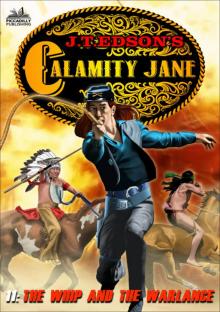 Calamity Jane 11
Calamity Jane 11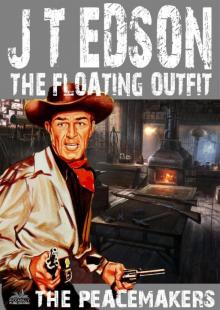 The Floating Outift 33
The Floating Outift 33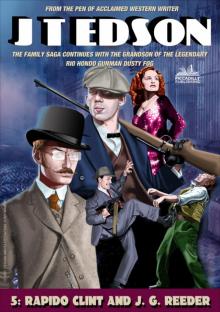 Cap Fog 5
Cap Fog 5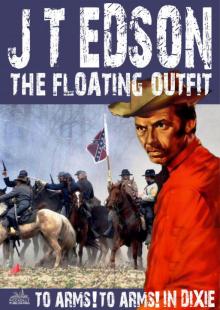 The Floating Outfit 34
The Floating Outfit 34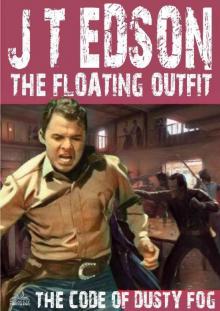 The Code of Dusty Fog
The Code of Dusty Fog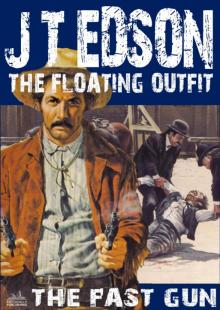 The Floating Outfit 21
The Floating Outfit 21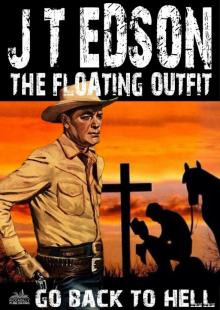 The Floating Outift 36
The Floating Outift 36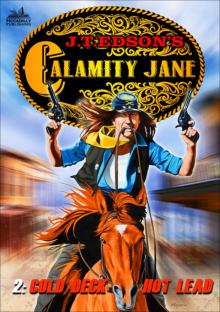 Calamity Jane 2
Calamity Jane 2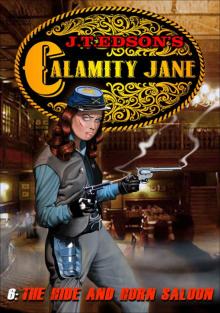 Calamity Jane 6: The Hide and Horn Saloon (A Calamity Jane Western)
Calamity Jane 6: The Hide and Horn Saloon (A Calamity Jane Western)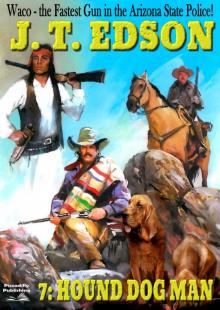 Waco 7
Waco 7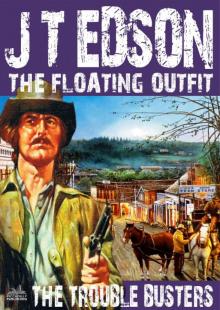 The Floating Outfit 25
The Floating Outfit 25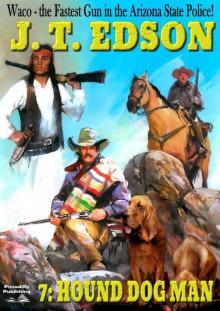 Waco 7: Hound Dog Man (A Waco Western)
Waco 7: Hound Dog Man (A Waco Western)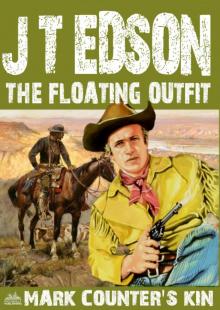 The Floating Outfit 47
The Floating Outfit 47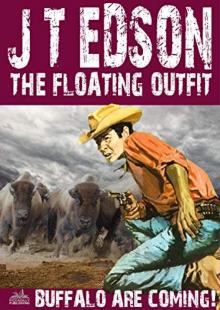 The Floating Outfit 42: Buffalo Are Coming!
The Floating Outfit 42: Buffalo Are Coming!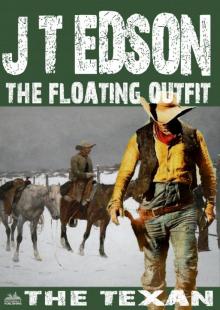 The Floating Outfit 46
The Floating Outfit 46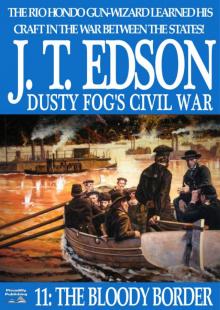 Dusty Fog's Civil War 11
Dusty Fog's Civil War 11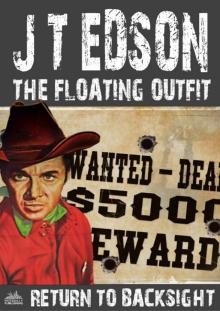 The Floating Outfit 61
The Floating Outfit 61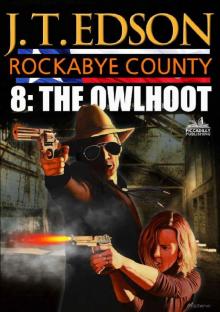 The Owlhoot
The Owlhoot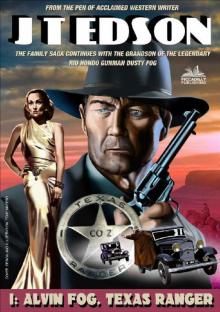 Alvin Fog, Texas Ranger
Alvin Fog, Texas Ranger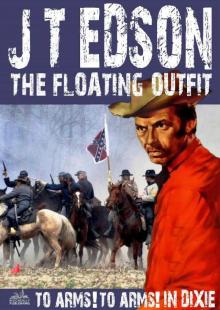 The Floating Outfit 34: To Arms! To Arms! In Dixie! (A Floating Outfit Western)
The Floating Outfit 34: To Arms! To Arms! In Dixie! (A Floating Outfit Western)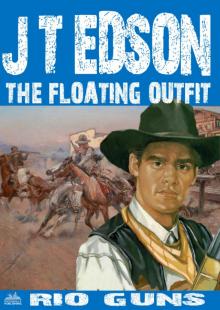 The Floating Outfit 44
The Floating Outfit 44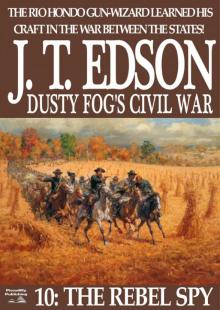 Dusty Fog's Civil War 10
Dusty Fog's Civil War 10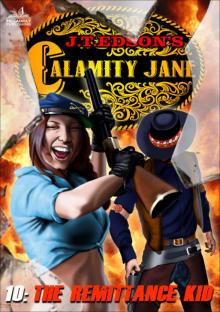 Calamity Jane 10
Calamity Jane 10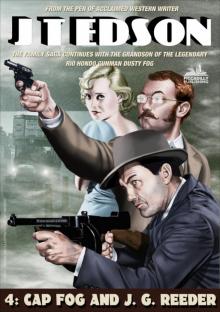 Cap Fog 4
Cap Fog 4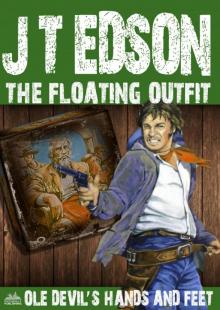 The Floating Outfit 51
The Floating Outfit 51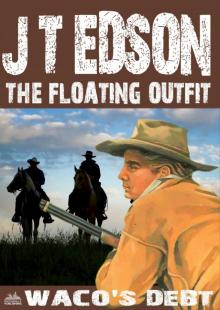 The Floating Outfit 50
The Floating Outfit 50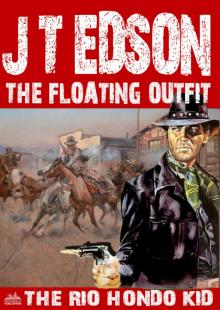 The Floating Outfit 49
The Floating Outfit 49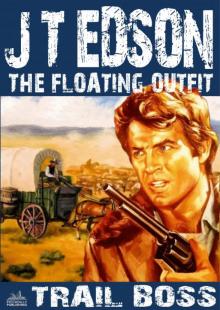 The Floating Outfit 10
The Floating Outfit 10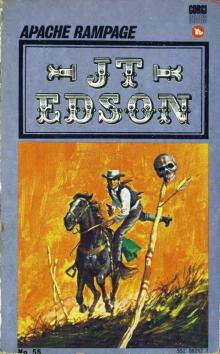 Apache Rampage
Apache Rampage The Floating Outfit 15
The Floating Outfit 15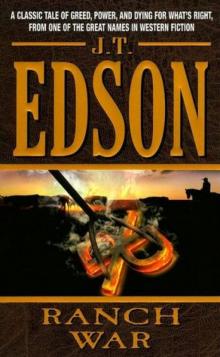 Ranch War
Ranch War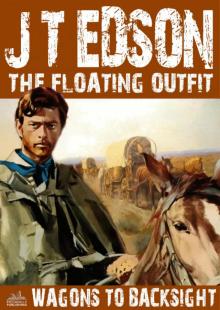 The Floating Outfit 11
The Floating Outfit 11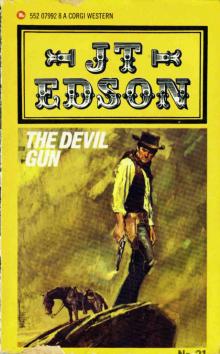 The Devil Gun
The Devil Gun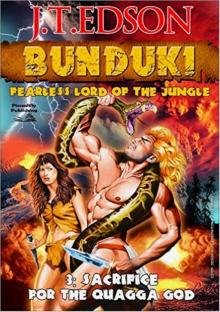 Sacrifice for the Quagga God (A Bunduki Jungle Adventure Book 3)
Sacrifice for the Quagga God (A Bunduki Jungle Adventure Book 3)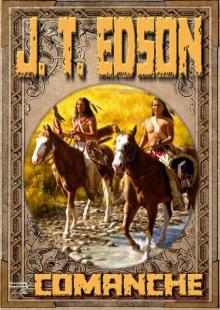 Comanche (A J.T. Edson Western Book 1)
Comanche (A J.T. Edson Western Book 1)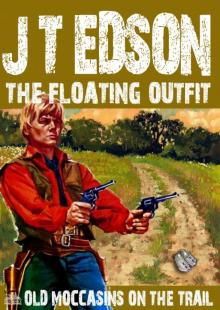 The Floating Outfit 48
The Floating Outfit 48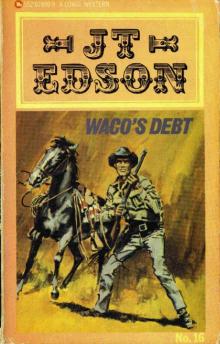 Wacos Debt
Wacos Debt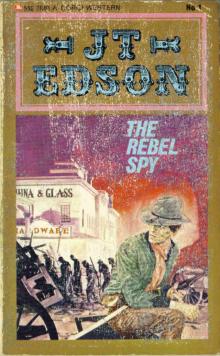 The Rebel Spy
The Rebel Spy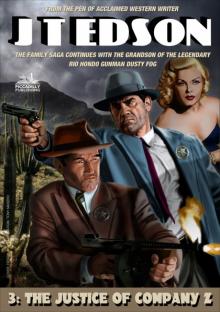 Cap Fog 3
Cap Fog 3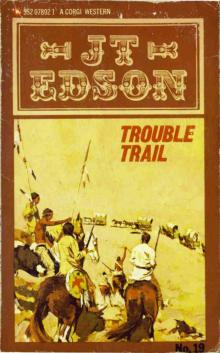 Trouble Trail
Trouble Trail Cold Deck, Hot Lead
Cold Deck, Hot Lead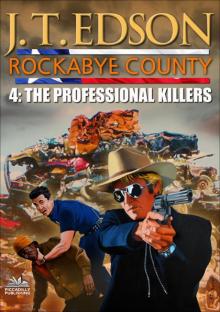 Rockabye County 4
Rockabye County 4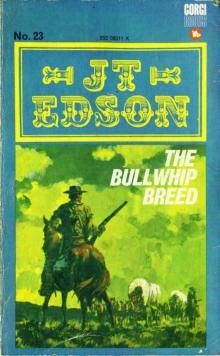 The Bullwhip Breed
The Bullwhip Breed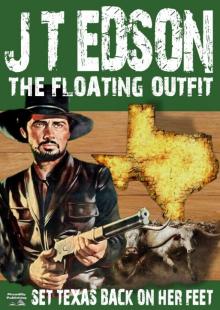 Set Texas Back On Her Feet (A Floating Outfit Western Book 6)
Set Texas Back On Her Feet (A Floating Outfit Western Book 6)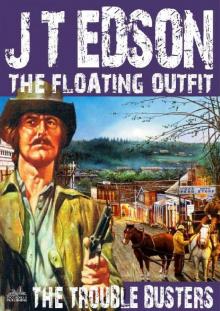 The Floating Outfit 25: The Trouble Busters (A Floating Outfit Western)
The Floating Outfit 25: The Trouble Busters (A Floating Outfit Western)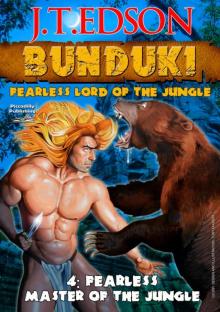 Fearless Master of the Jungle (A Bunduki Jungle Adventure
Fearless Master of the Jungle (A Bunduki Jungle Adventure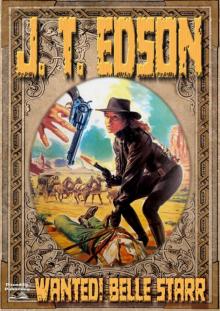 Wanted! Belle Starr!
Wanted! Belle Starr!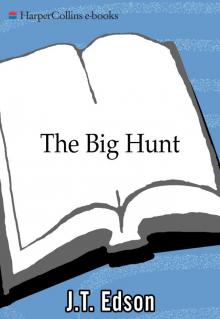 The Big Hunt
The Big Hunt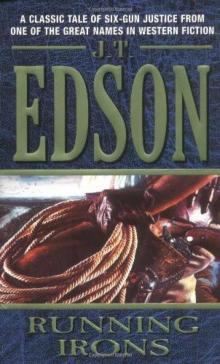 Running Irons
Running Irons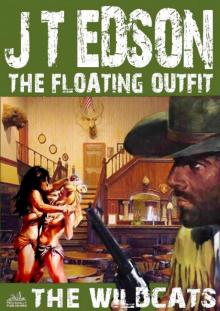 The Floating Outfit 19
The Floating Outfit 19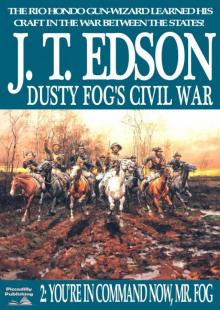 You're in Command Now, Mr Fog
You're in Command Now, Mr Fog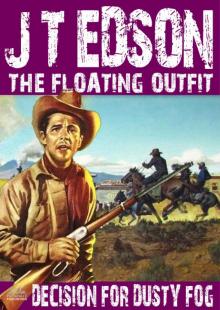 The Floating Outfit 27
The Floating Outfit 27 Texas Killers
Texas Killers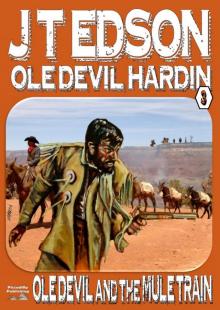 Ole Devil and the Mule Train (An Ole Devil Western Book 3)
Ole Devil and the Mule Train (An Ole Devil Western Book 3)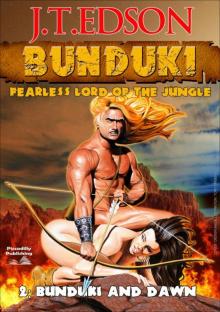 Bunduki and Dawn (A Bunduki Jungle Adventure Book 2)
Bunduki and Dawn (A Bunduki Jungle Adventure Book 2)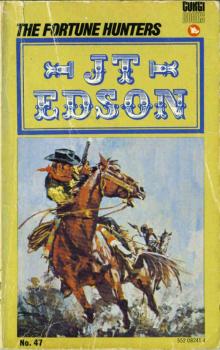 The Fortune Hunters
The Fortune Hunters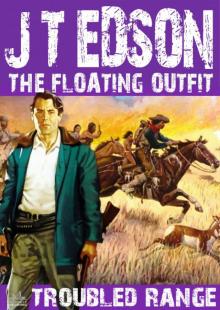 The Floating Outfit 12
The Floating Outfit 12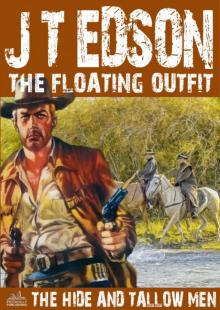 The Hide and Tallow Men (A Floating Outfit Western. Book 7)
The Hide and Tallow Men (A Floating Outfit Western. Book 7)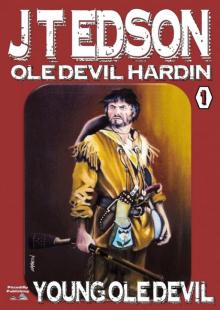 Young Ole Devil
Young Ole Devil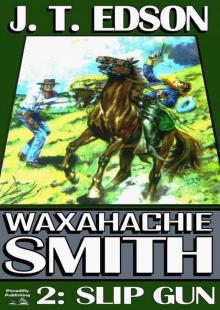 Slip Gun
Slip Gun The Drifter
The Drifter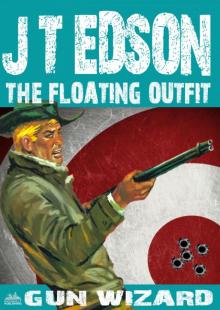 The Floating Outfit 45
The Floating Outfit 45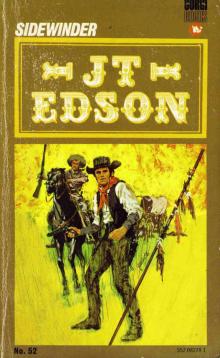 Sidewinder
Sidewinder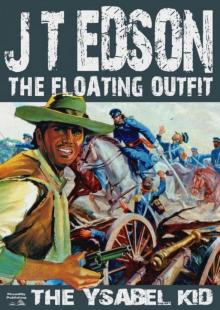 The Ysabel Kid
The Ysabel Kid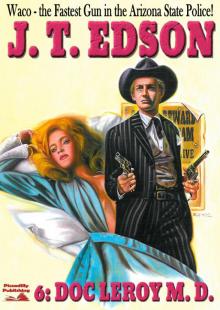 Waco 6
Waco 6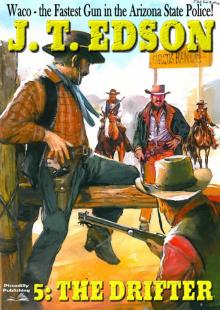 Waco 5
Waco 5 Point of Contact
Point of Contact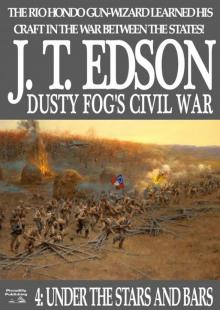 Under the Stars and Bars (A Dusty Fog Civil War Western Book 4)
Under the Stars and Bars (A Dusty Fog Civil War Western Book 4)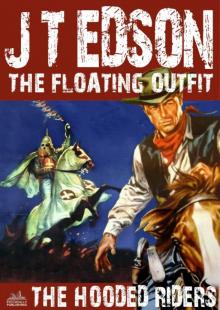 The Floating Outfit 9
The Floating Outfit 9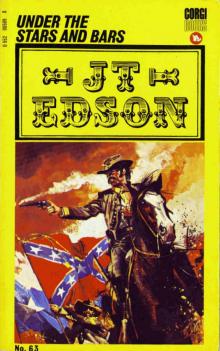 Under the Stars and Bars
Under the Stars and Bars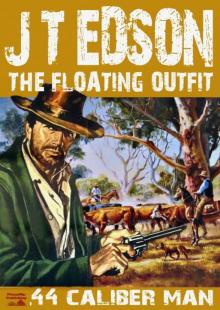 .44 Caliber Man
.44 Caliber Man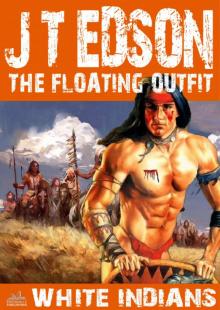 The Floating Outfit 17
The Floating Outfit 17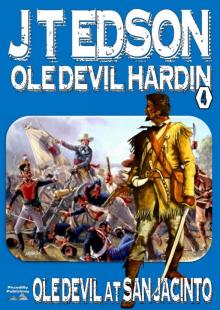 Ole Devil at San Jacinto (Old Devil Hardin Western Book 4)
Ole Devil at San Jacinto (Old Devil Hardin Western Book 4)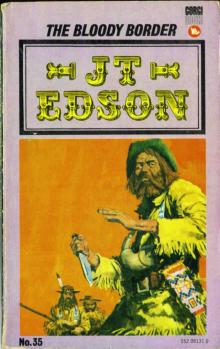 The Bloody Border
The Bloody Border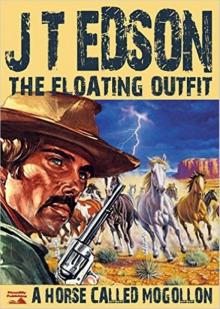 A Horse Called Mogollon (Floating Outfit Book 3)
A Horse Called Mogollon (Floating Outfit Book 3)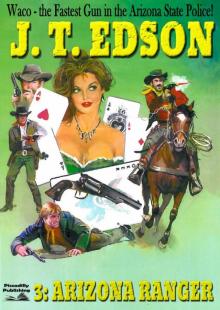 Waco 3
Waco 3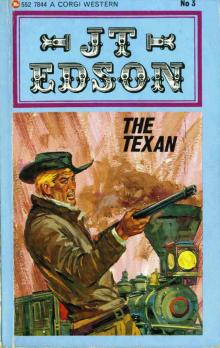 The Texan
The Texan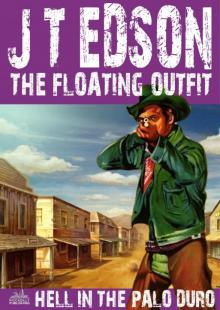 The Floating Outfit 35
The Floating Outfit 35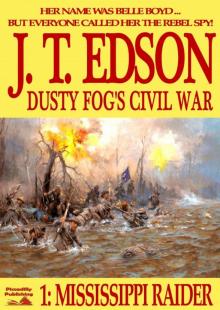 Mississippi Raider
Mississippi Raider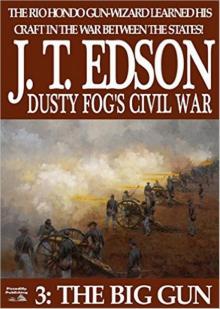 The Big Gun (Dusty Fog's Civil War Book 3)
The Big Gun (Dusty Fog's Civil War Book 3)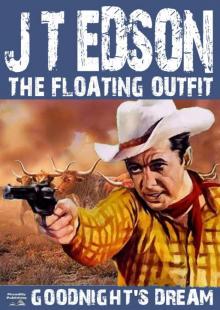 Goodnight's Dream (A Floating Outfit Western Book 4)
Goodnight's Dream (A Floating Outfit Western Book 4) Waco 4
Waco 4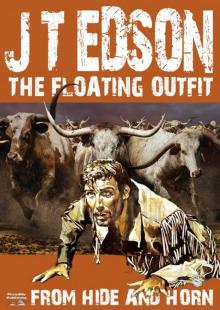 From Hide and Horn (A Floating Outfit Book Number 5)
From Hide and Horn (A Floating Outfit Book Number 5)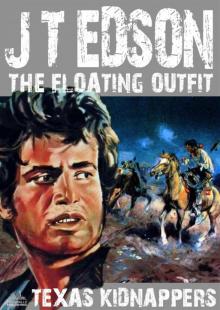 The Floating Outfit 18
The Floating Outfit 18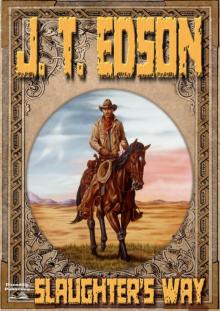 Slaughter's Way (A J.T. Edson Western)
Slaughter's Way (A J.T. Edson Western)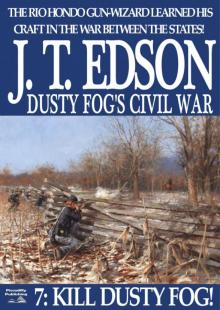 Dusty Fog's Civil War 7
Dusty Fog's Civil War 7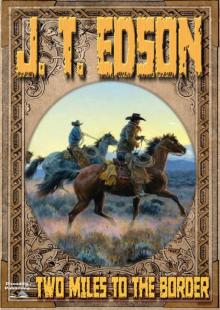 Two Miles to the Border (A J.T. Edson Western)
Two Miles to the Border (A J.T. Edson Western)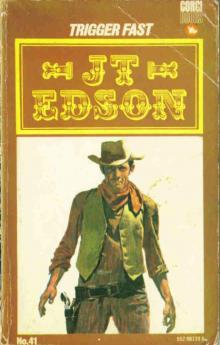 Trigger Fast
Trigger Fast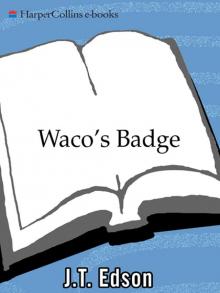 Waco's Badge
Waco's Badge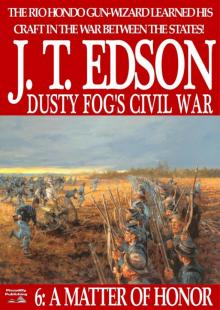 A Matter of Honor (Dusty Fog Civil War Book 6)
A Matter of Honor (Dusty Fog Civil War Book 6)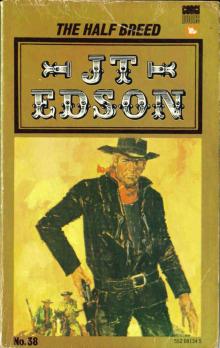 The Half Breed
The Half Breed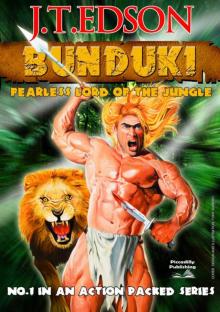 Bunduki (Bunduki Series Book One)
Bunduki (Bunduki Series Book One)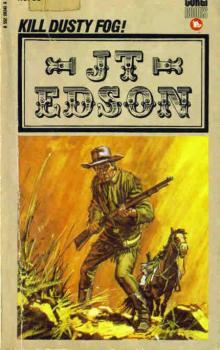 Kill Dusty Fog
Kill Dusty Fog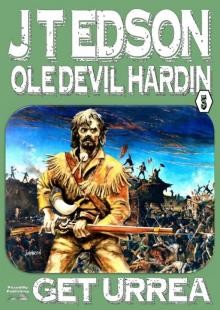 Get Urrea! (An Ole Devil Hardin Western Book 5)
Get Urrea! (An Ole Devil Hardin Western Book 5)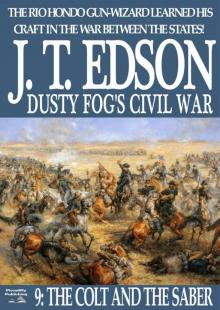 Dusty Fog's Civil War 9
Dusty Fog's Civil War 9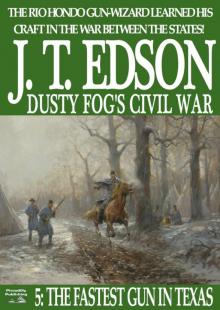 The Fastest Gun in Texas (A Dusty Fog Civil War Book 5)
The Fastest Gun in Texas (A Dusty Fog Civil War Book 5)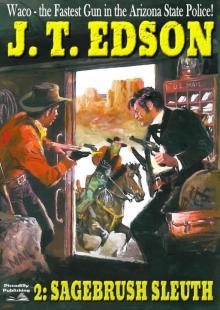 Sagebrush Sleuth (A Waco Western #2)
Sagebrush Sleuth (A Waco Western #2)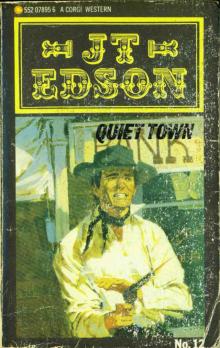 Quiet Town
Quiet Town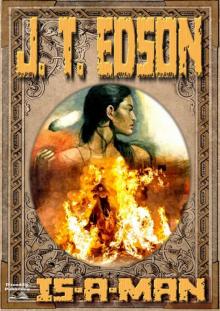 Is-A-Man (A J.T. Edson Standalone Western)
Is-A-Man (A J.T. Edson Standalone Western)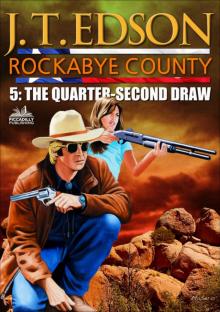 Rockabye County 5
Rockabye County 5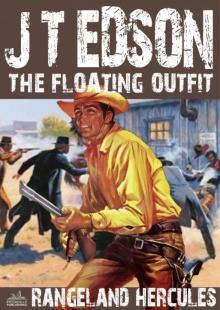 The Floating Outfit 14
The Floating Outfit 14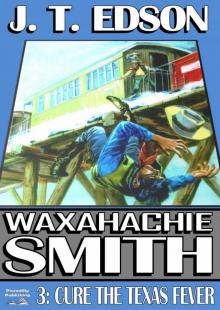 Cure the Texas Fever (A Waxahachie Smith Western--Book 3)
Cure the Texas Fever (A Waxahachie Smith Western--Book 3)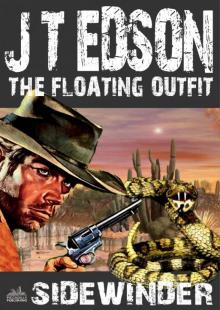 The Floating Outfit 13
The Floating Outfit 13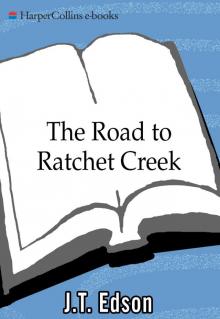 The Road to Ratchet Creek
The Road to Ratchet Creek